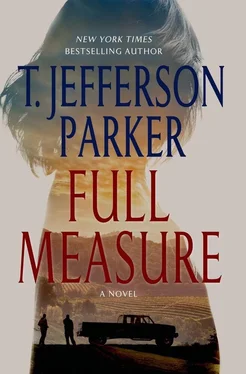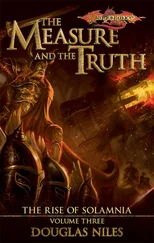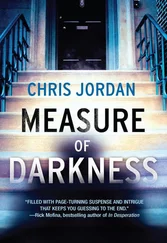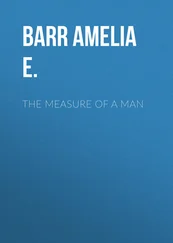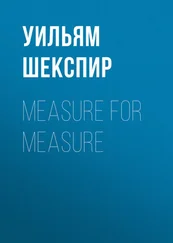It was easy to think of a bale as someone who wished him harm, like one of the rapacious takers in the Cruzela Storm songs cranking in his ears, like Edgar or his foul-mouthed girlfriend or Evelyn Anders or his father. It felt good to impale them over the next hours, spreading them evenly around the trees that he had tried so hard to save and only managed to put at even greater peril. It was good to focus anger on a person, to have a face to use for a target. And thanks to me, he thought, when the rain comes, this soil and these trees will be protected by this straw. Just as when the fire had come, the Norris residence had survived because he’d trimmed back the trees and bushes around the house and outbuildings. And what exactly had Dad said about that? Not one word, Ted thought. Only his mother had had the good manners to thank him for what he’d done. And Pat. Patrick had said something right off about him doing a good job. Or had he?
Near sundown Ted carried the pitchfork back to the truck. He checked the creatures in their containers and set them up front. His phone rang. He checked the caller, took a deep breath and spoke in a low voice. “’Lo, Cade.”
He ditched family cocktails, showered and shaved, and drove to Pride Auto Repair. There were three cars in the lot, Cade’s white-and-aqua Bel Air, a Dodge Magnum, and a red Dodge pickup truck, late fifties, beautifully restored. Ted heard music inside, hard and reckless. He stood under the neon Model T sign and looked through the open front door. The overhead lights were strong and lit the room like a stage. Cade was in there, shooting pool with a man while two women sat on stools and watched. Cade wore a holster low on his leg like a gunfighter and a six-gun glinted in the leather. The women wore halter tops and small skirts and their legs shined in the overhead light. They held bottles of beer. The man playing pool with Cade was young, all muscles and freckles. He wore a black leather vest over his naked torso, a black cowboy hat, and had a large handgun on his belt, holstered high and back, like a detective. They all looked at him standing at the open door. Cade smiled. “What do you want, Ted, an engraved invitation?”
Ted stepped in. Cade bent to the table, formed his bridge, and sunk the seven ball with a clack so sharp it pierced the music. The strong young man ignored him but one of the women, the brunette, smiled and held up her beer. “Want one?”
“Sure.”
“The fridge is in the back, cold ones up front.”
“Can I get one for you?”
“Bring it on, big guy.”
“Anyone else?”
No one answered so Ted got two cold ones. He pressed them to the opener on the wall while he looked around the repair bay. There were two cars up on the lifts and two more waiting, hoods up. Back in the lobby he gave the woman the beer and pulled up a bar stool a respectful distance from her. The muscular man eyed him then looked back to the table. Cade leaned against the wall by the cue rack, twisting a cube of chalk onto his stick. The jukebox played hard fast music from a band that Ted wasn’t familiar with, something about brass knuckles, red blood and a flag that still waves. He leaned over for a look at the selection and saw that the old retro jukebox was in fact a newer one, outfitted to play CDs.
“I’m Joan and that’s Amber and Trevor,” said the brunette. She had a compact face and a pleasant smile and she was older than he had thought at first. “Friends of Cade’s from Idaho. Spirit Lake.”
“Are there really spirits in it?”
“Indian ghosts is the legend. It’s beautiful there. Cold in winter. We came to talk Cade into moving back but we’re already in love with this place and we only been here two days. This is like America used to be.”
“Before government took over.”
“Absolutely. Are you a friend of Cade’s?”
“I’ve known him my whole life, pretty much, so, yeah.”
“Then you know all about what happened here.”
“Yep, right out back. Mrs. Magnus was locking up and he surprised her.”
“Yes, and she wasn’t armed to defend herself.”
Ted nodded and saw the glance between Amber and Cade. Amber slid off her stool, shut and locked the front door, and made sure the blinds were closed. Joan set her beer on the counter and dug into her purse and produced an empty.45 caliber cartridge casing and a small glass vial. Looking intent, she unscrewed the vial and tapped some shiny white powder into the shell and sniffed it up her nose. She shuddered and grinned at Ted and loaded one for him. Ted peered down into the casing. There wasn’t much white stuff down there. “Crank?”
“Best there is. Cooked not all that far from here. Smooth and silky and it’ll keep you talkin’ into next week. Just kidding. There’s hardly any crash.”
“Really,” said Ted. He wanted to sound knowledgeable though he’d never tried methamphetamine for fear he might like it too much. He saw Cade and Trevor watching him. Joan smiled crookedly. He brought the shell to his nose and sniffed it up. There was an explosive burn that made his eyes water, then nothing.
“It’ll take a few seconds,” said Joan. She took the casing and put the works back into her bag. Ted watched her, listening to the billiard balls knocking around the table and trying to hear the muttered comments of Cade and Trevor. The singer on the CD screamed on about “cleaning up America and taking out the trash!” Suddenly Ted’s heart had shifted into a higher gear and he felt a great torque unleashed inside him, like horses coming down the stretch — power, clarity, and confidence.
“Woah,” he whispered.
“Woah is right,” said Joan. She had straight shiny hair held back with a barrette, and a cute nose and pretty hands. “You’d think the Magnus family would have gotten a little help after the mother was raped and murdered by a psychopathic killer,” she said, turning to Ted. “A black psychopathic killer. Instead, the monster got a fancy state hospital room and the Magnuses got bankrupted by the courts. Thank you, government. The liberal press didn’t cover that angle, though. Hardly a word of sympathy for the family because they believe in their own white race, right? Then later in court they made it sound like Jed Magnus was sending killers around the world to kill black men. Bankrupted him. Absurd.”
“Joan?” said Cade, settling in for his next shot. “Shut the fuck up, will you? That’s old news.”
“Which relates directly to our own present times,” said Joan.
“Be a dumb shit,” said Cade. “You have the right.”
“I was eleven when she was murdered,” said Ted. He really wanted to talk. Had to talk. The crank brought out old feelings. Suddenly it was like he was here, fifteen years ago, age eleven. The crank seemed to bore out his brain, clean away the clutter and increase the capacity of it. “I rode my bike down here from home the next day and the whole place was still behind crime-scene tape. The deputies were here to keep people from coming in, so I sat in the shade across the street and watched all the people wanting to see where the murder happened. People driving and walking, and tons of kids on bikes and scooters, like me. And news crews, dozens of them. And by the time—”
“I was eighteen, living in Spirit Lake,” said Joan. “Everybody knew about it because Jed’s newsletter was popular. When Jed moved the family there later, we were honored to have them. There was a nice welcome party, home-cooked potluck and a bluegrass band. People showed up, like they’re supposed to. The whole town. Half of them were retired cops from ugly cities. Like my dad. So don’t you diss me, Cade Magnus.”
On top of the crank, the beer hit Ted surprisingly hard, not having drunk alcohol for nearly six months. He hopped off the stool and got another bottle and strode back. He felt seven feet tall, sleek, and extremely intelligent. No foot pain at all. Cade banked in the eight ball, set his cue on the table, and raised a fist. “Ted, you’re up. Ladies, doubles?”
Читать дальше
